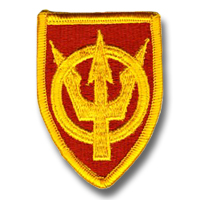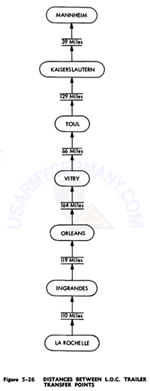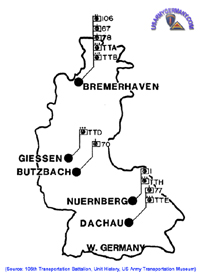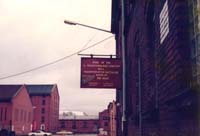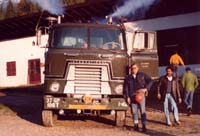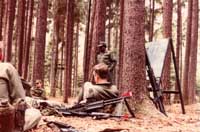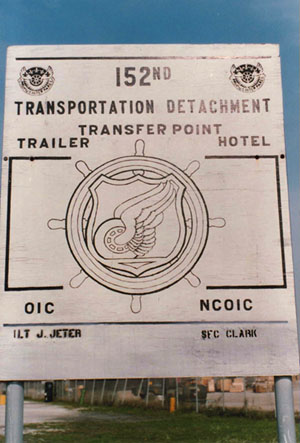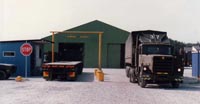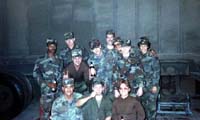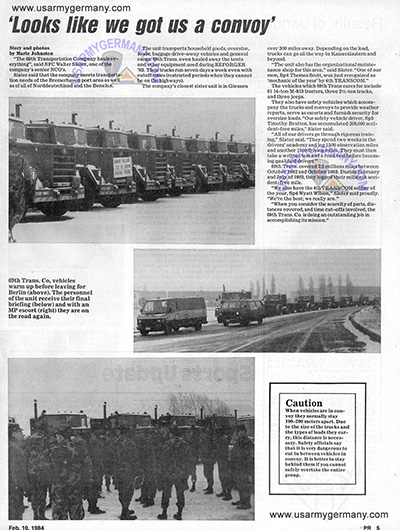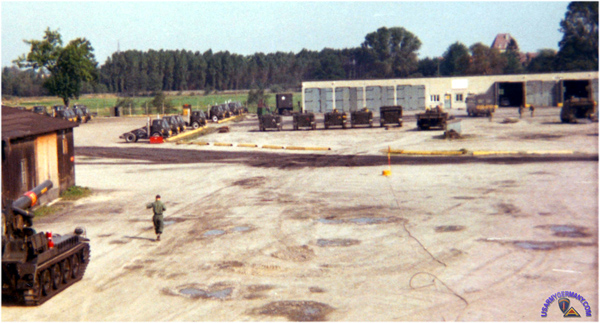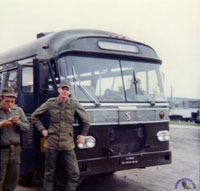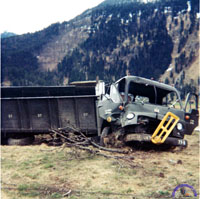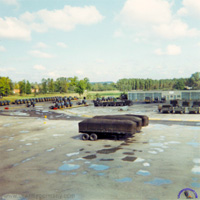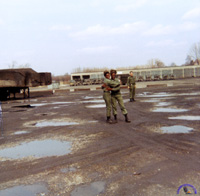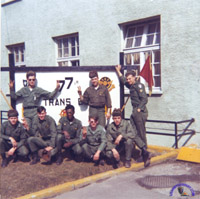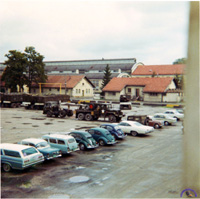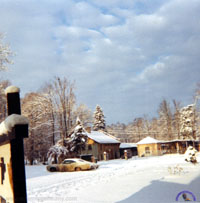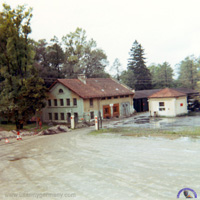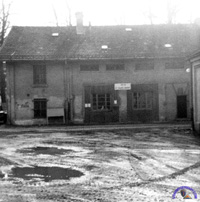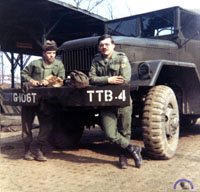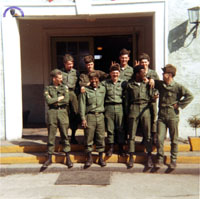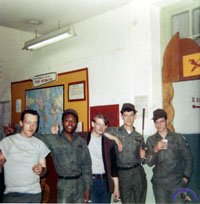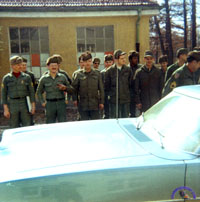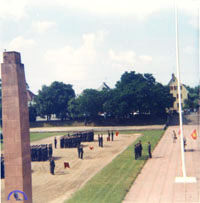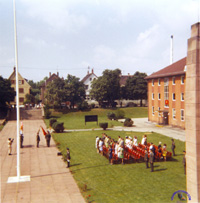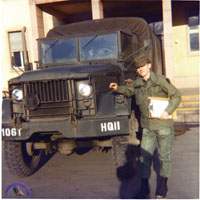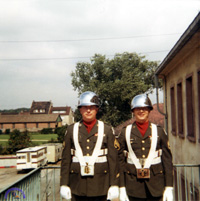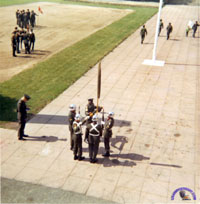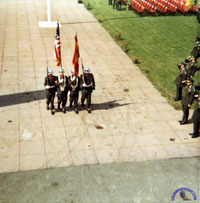| If you do
NOT see the Table of Contents frame to the left of this page, then
Click here to open 'USArmyGermany' frameset |
||||||||||||||||||||||||||||||||||||||||||
|
106th
Transportation Battalion |
||||||||||||||||||||||||||||||||||||||||||
|
|
||||||||||||||||||||||||||||||||||||||||||
|
||||||||||||||||||||||||||||||||||||||||||
|
|
||||||||||||||||||||||||||||||||||||||||||
| SUBORDINATE UNITS | ||||||||||||||||||||||||||||||||||||||||||
|
||||||||||||||||||||||||||||||||||||||||||
| (1) As a result of FRELOC, company moved to Bremerhaven. | ||||||||||||||||||||||||||||||||||||||||||
| 806th Transportation Battalion History | ||||||||||||||||||||||||||||||||||||||||||
| 1952 - 1955 | ||||||||||||||||||||||||||||||||||||||||||
| (Source: 106th Transportation Battalion, Online Unit History, Biggs Library and Information Center) | ||||||||||||||||||||||||||||||||||||||||||
The 806th Transportation Battalion was the forerunner of the 106th in Bussac. The battalion's mission at that time was to clear the port of Bordeaux and line-haul cargo and supplies into another battalion's area of operations. The cargo then moved along the French line of communications (LOC) into Germany for support of US Forces there.
The next battalion to the east was the 2nd Transportation Battalion. |
||||||||||||||||||||||||||||||||||||||||||
| 106th Transportation Battalion History | ||||||||||||||||||||||||||||||||||||||||||
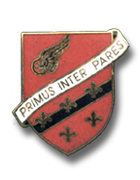 106th Transportation Bn DUI (1950s-1965)
106th Transportation Bn DUI (1950s-1965) |
||||||||||||||||||||||||||||||||||||||||||
Reorganized an redesignated 20 November 1943 as HHD 106th Quartermaster Battalion (Mobile) |
||||||||||||||||||||||||||||||||||||||||||
| (Source: 106th Transportation Battalion, Online Unit History, Biggs Library and Information Center) | ||||||||||||||||||||||||||||||||||||||||||
| 106th Transportation Battalion Wonderful unit history compiled by the Transportation Historian, Richard Killblane, at Fort Eustis, VA. As the historian states, the records for the battalion are nearly non-existent due to the unit's frequent moves during the last 50 years of its existence. The history has been "pieced together" and many pieces are still missing or lost forever. (Anyone having historical information that can augment the history or provide corrections is encouraged to contact the historian at Fort Eustis or myself.) The following is a summary of the extensive unit history. To read it all, click here (it is a BIG file, though - 6 MB+). |
||||||||||||||||||||||||||||||||||||||||||
| Early Years in France, 1955 - 1958 (Bussac, France) Western France, 1959-1963 (Croix Chapeau, France) Northern Germany, 1964-1969 (Bremerhaven, Germany) Rüsselsheim, 1969-1993 (Azbill Barracks, Rüsselsheim, Germany) |
||||||||||||||||||||||||||||||||||||||||||
| The Early Years in France, 1955 - 1958 | ||||||||||||||||||||||||||||||||||||||||||
| Headquarters and Headquarters Company, 106th Transportation Battalion (Truck)(Army) was activated at Landes de Bussac, France on 18 March 1955. The battalion was formed by transferring personnel and equipment from the Army Reserve unit, 806th Trans Bn, which was concurrently inactivated (released from active service) as part of the Army's program to
return all reserve component units (National Guard and Army Reserve) to the United States that had been activated as part of the Troop Augmentation program in the early 1950s. With its replacement of the 806th, the 106th most likely also assumed the former battalion's mission and facilities. The 106th Trans Bn was one of the truck battalions tasked with the line-haul mission by military truck in the COMZ. These truck battalions were stationed along the Line of Communications (LOC) that extended from the 11th Transportation Terminal Command on the West Coast of France to Mannheim, Germany. The 106th Battalion's responsibility was clearing the ports operated by the 11th TTC on the French west coast and moving the incoming supplies by truck along the French highway to the Ingrandes Trailer Transfer Point. |
||||||||||||||||||||||||||||||||||||||||||
|
||||||||||||||||||||||||||||||||||||||||||
| It is not clear when the 72nd Trans Co joined the 106th Trans Bn. The USAREUR STATION LIST for Sept 1956 shows the unit already located at Ingrandes, with assignment to BASEC as is the 106th Trans Bn. The Unit History does not mention the 72nd. On 4 Jan 1958, LTC Thomas L. Lyons assumed command of the 106th. In July 1958, two companies of the 106th (78th and 583rd Trans Co) were alerted for deployment to Lebanon as part of the 201st Log Comd. They sailed to Lebanon on 27 July 1958. This mission enden in Oct and the two returned to the 106th. |
||||||||||||||||||||||||||||||||||||||||||
| Western France, 1959 - 1963 | ||||||||||||||||||||||||||||||||||||||||||
| Bremerhaven, 1964 - 1969 | ||||||||||||||||||||||||||||||||||||||||||
 Battalion Headquarters sign at Carl Schurz Kaserne, c. 1968 (Larry Curts) |
||||||||||||||||||||||||||||||||||||||||||
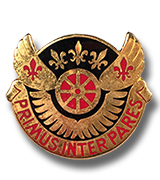 106th Transportation Bn DUI (1966-1990s) 106th Transportation Bn DUI (1966-1990s) |
||||||||||||||||||||||||||||||||||||||||||
| 1965 | ||||||||||||||||||||||||||||||||||||||||||
| (Source: William Cassing) | ||||||||||||||||||||||||||||||||||||||||||
| I was stationed at Truck Terminal 2 (TTB) at Kassel-Waldau from early 1965 (02/1965?) until separation in 07/1966. I was a radio operator, although my primary duties were dispatcher, Telex Operator and, occasionally, POL clerk. As I reviewed the 1965-66 portion of the information on your page, I noticed one point that does not agree with my memories of that time. While it may be a minor point, TTB (to which I was assigned) was in Kassel, but TTD was in Giessen (although staffing varied widely) - and was there from the date I arrived until I left. My only recollection of command personnel is our NCOIC, SSG John Savage. Our operational units were (I believe) the 67th, 70th, 77th and 598th Transportation Companies. Billeting was in the mountains some distance away at Kassel-Rothwesten, although my wife and I lived in civilian housing in downtown Kassel. I would appreciate your assistance in gathering any information you might be able to provide. Part or my curiosity is due to a recent discovery that my paternal grandfather was born and raised in Kassel until he came to the USA in the 1880's or 1890's: William Cassing) ADDITIONAL INFORMATION Waldau Kaserne (as we knew it) was located at the site of what may have been a former airfield. We were located within 2-3 miles of Kassel in a complex of building which included a large warehouse with TTB (1965) in a corner office and command offices on a second level at the opposite end of the building. As I recall, the activity in the warehouse was minimal, but I don't remember its use. Nearby was a large building which was not used by the 106th; its primary use was as a transit barracks for combat units traveling throughout Germany. Past that building were two other structures. The smaller of the two was the operating office of a POL station. Across the driveway was a slightly larger building into which TTB was moved in late 1965 or early 1966. It consisted of an operations center housing the telex unit, dispatch center, CO's office, an office for a secretary/translator and, strangely, a separate office for POL and TT vehicle dispatch. Farther down the driveway was another large building housing tow trucks and a mechanical shop. At the other end of the complex was what appeared to be a cross between a ramshackle building and a combat bunker, but was, in fact the tire shop for trailers which were parker in an adjacent open field. During the winter, it was common to use large wooden pads under the landing gear, and even then, it was not unusual to have trailers sink into the soft ground, requiring a tow truck, often with a "belly harness" to lift the front of the trailer. Although the paved areas may, at one time, runways, they had been resurfaced; however the dearth of paved areas indicated that the only paving may have been runways and staging areas. I do recall that we had a railway spur which was used for fuel tankers Communications: We had no radio equipment beyond local field communications gear. Communication was via telephone and telex. Bremerhaven (106th Trans Bn HQ?) had an AN/GRC-26D in a truck towing its own generator, the use of which was classified. At Kassel, we had several jeeps with radios mounted in the back seat, but I don't remember the designation; all seemed to be WWII leftovers and were of little use. While I was in Germany, these 4WD vehicles were replaced by an inferior 2WD version with no communication equipment. We had a stockpile of PRC-6 units for each company, but I don't recall ever seeing one in use. |
||||||||||||||||||||||||||||||||||||||||||
| Ruesselsheim, Germany, 1970 - 1993 | ||||||||||||||||||||||||||||||||||||||||||
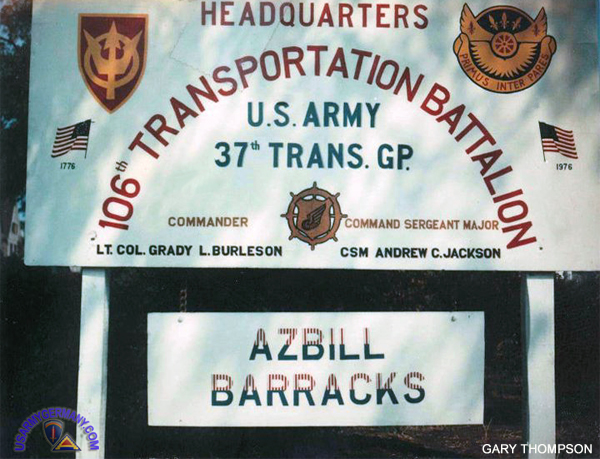 Battalion Headquarters sign at Azbill Barracks, c. 1976 (Gary Thompson) |
||||||||||||||||||||||||||||||||||||||||||
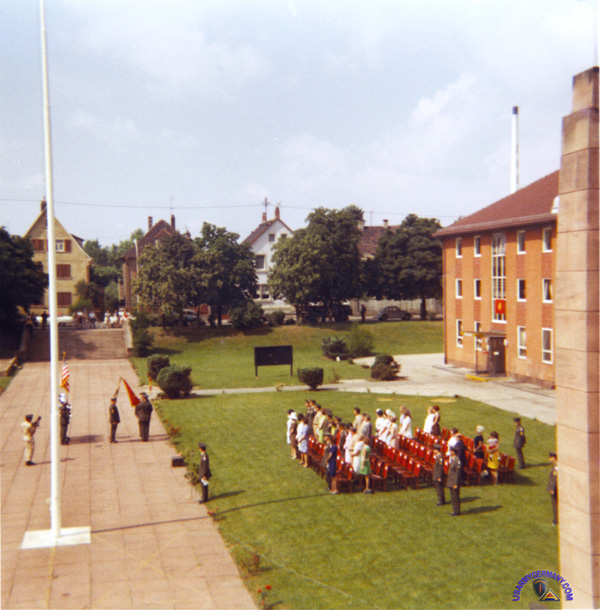 Change of Command ceremony, Azbill Barracks, 1970 |
||||||||||||||||||||||||||||||||||||||||||
In late 1969 the decision was made to move the 106th Trans Bn to a more central location within Germany. In January 1970 the battalion, then under the command of LTC Conner, moved with the 78th Trans Co to Azbill Barracks, Ruesselsheim (between Frankfurt and Darmstadt). (The 67th Trans Co and TTA remained in Bremerhaven. The 67th would later be inactivated, in July 1972.) Azbill Barracks, originally known by the Americans as Ruesselsheim Kaserne, was redesignated on 12 July 1967 as Azbill Barracks. (The kaserne was used post WWI as a school and then for a civilian labor group unit. From 1961 to 1968, the kaserne served as the home station for HQ 4th TRANSCOM and the 501st Transportation Company (Light). From 1971 to 1972, the 37th Transportation Command received the newer model International Harvester Commercial (IHC) tractors 4070 and 2000D models. The northern most battalion, the 106th, which had the longest run clearing cargo out of the Port of Bremerhaven received the IHC4070s. The IHC2000Ds had single axles and could not pull the 20-foot containers as well. Two months later, on 31 August 1972, TTA was attached to the 78th Transportation Company in Ruesselsheim. Bremerhaven cargo was now cleared solely by rail. Sometime after FRELOC. the 70th left Kassel and relocated in Schloss Kaserne, Butzbach. The unit later moved a few miles north to its present home on the Giessen Army Depot. Another long time 106th company, the 77th Transportation Company was inactivated at Dachau on 25 June 1970. |
||||||||||||||||||||||||||||||||||||||||||
| ORGANIZATION (Fall 1972): | ||||||||||||||||||||||||||||||||||||||||||
|
||||||||||||||||||||||||||||||||||||||||||
| With the drawdown in Vietnam in the early 1970s, the focus of US defense strategy shifted back to Europe and the volume of supplies and equipment being moved along the Bremerhaven-Giessen Line of Communications increased. The resulting greater demand for military highway transportation assets was intially satisfied by moving (Nov 1974) the tractor assets of the Refrigeration Platoon, 53rd Trans Bn to Bremerhaven and assigning the platoon to the 106th Trans Bn. By early 1975, it was determined that a full transportation company was needed in the northern Germany area as well as a Transfer Trailer Point. In Sept 1975, the 69th Trans Co was released from attachment to the 28th Trans Bn and attached to the 106th with subsequent movement to Bremerhaven. (The tractors of the TDA reefer platoon were moved to Giessen.) |
||||||||||||||||||||||||||||||||||||||||||
| ORGANIZATION (Late 1975): | ||||||||||||||||||||||||||||||||||||||||||
|
||||||||||||||||||||||||||||||||||||||||||
| (to be continued) | ||||||||||||||||||||||||||||||||||||||||||
| If you have more
information on the history or organization of the 106th Transportation
Bn, please contact me |
||||||||||||||||||||||||||||||||||||||||||
| 1968 | ||||||||||||||||||||||||||||||||||||||||||
| (Source: STARS & STRIPES, Nov 12, 1968) | ||||||||||||||||||||||||||||||||||||||||||
| The 106th Transportation Battalion "ROAD RUNNERS" provides long-haul transportation along a 600-mile route that stretches from Bremerhaven to Dachau (near Munich). (Occasional runs are made to destinations in Belgium and the Netherlands also.) CO of the Bn is Lt Col Donald J. Opitz. The Battalion is comprised of 13 subordinate units that are equipped with a total of 300 5-ton tractors and 600 trailers. |
||||||||||||||||||||||||||||||||||||||||||
| ORGANIZATION (Nov 1968): | ||||||||||||||||||||||||||||||||||||||||||
|
||||||||||||||||||||||||||||||||||||||||||
| [1] STATION LIST, 30 June 1968 | ||||||||||||||||||||||||||||||||||||||||||
|
||||||||||||||||||||||||||||||||||||||||||
|
|
||||||||||||||||||||||||||||||||||||||||||
| 1st Transportation Company | ||||||||||||||||||||||||||||||||||||||||||
| The Early Years in France | ||||||||||||||||||||||||||||||||||||||||||
| 1953 | ||||||||||||||||||||||||||||||||||||||||||
| (Source: STARS & STRIPES, February 19, 1953) | ||||||||||||||||||||||||||||||||||||||||||
| The first refrigerator truck company in the history of the US Army has been assigned to the Orleans Area Command and further attached to the 9th Trans Highway Trans Gp at Saran. The company's CO is Capt Maurice K. Wilgus. The 1st Trans Truck Co (Refrigerator) is equipped to transport frozen and perishable cargo. Operation of the company's equipment will be studied to provide data that can be useful in the organization of similar Transportation Corps units throughout the Army. |
||||||||||||||||||||||||||||||||||||||||||
| 1955 | ||||||||||||||||||||||||||||||||||||||||||
| (Source: STARS & STRIPES, December 28, 1955) | ||||||||||||||||||||||||||||||||||||||||||
| 1st Transportation Company (Medium Truck Refrigeration) is stationed at Orleans, France. (Webmaster note: STATION LIST for Sept 1956 indicates that 1st Trans Co is assigned to Orleans Installation at this time.) 1st Trans Co is the only Army Transportation Corps refrigeration company in Europe. The company has 60 "reefer" tractor-trailers that are used to transport fresh and frozen foods as well as medical supplies (needing to be refrigerated) for long, cross-country deliveries. (Similar Quartermaster Corps "reefer" vans are typically used for short-haul deliveries.) On a typical day, about 12 vans from the 1st Trans Co leave Orleans at 6 am and head for the Entrepots Frigorifiques de l'Union cold stores warehouse in Paris. (The plant is leased by the Quartermaster Corps to stock perishable foods. A 30-day stock of cold supplies is kept on hand at the plant. The QM cold stores plant in Paris maintains 17 refrigerator vans of its own for short-haul deliveries in and around Paris.) Once loaded with the day's cargo (a van can carry up to 71/2 tons of supplies), the truckers return to their Orleans home station. At 6 am the next morning they start their hauls to different locations throughout France. The longest haul is the one to Bordeaux - more than 400 miles. At the start of the trip, the temperature in the "reefer" van is set to zero degrees for frozen food loads and 32 degrees for fresh fruits, vegetables and milk. The vans are serviced by "reefer" mechanics at Saran. Of the 60 vans assigned to the 1st Trans Co, about 35 are on the road every week. |
||||||||||||||||||||||||||||||||||||||||||
| 1960 | ||||||||||||||||||||||||||||||||||||||||||
| (Source: Email from Patrick Ryan) | ||||||||||||||||||||||||||||||||||||||||||
| Hello Walter, I enlisted in 1960 when I was actually 15 years old. Recruiters knew a lot of tricks then. I joined 1st Trans Co in April and had just turned 16. 1st Trans. Co. was at Maison Fort. It was a refrigerated company and was changing to cargo. We had about a week of training in M52 semis which was mostly learning to back up. There were truck terminals from southern France to Germany. We mostly would run to Ingrandes and turn around or Vitry La François where we would sometimes spend the night or turn around. Each T.T. had a dispatch, maintenance and tire shop. Trucks were governed at just over 50 mph which was just fast enough to get beside a bouncing betty and get hung up. We would often take the governor line from carb. Seals were easy to come by. We had a good safety record though. I only recall one serious wreck. The guy was killed in a turnover. I can't recall his name but I know he had a good friend named Yoakum. I left there in Jan. 1963 and came back to Camp des Loges France in Oct 63. For a year or so I drove from the motor pool at Bel Manoir mostly for school runs and field trips for students at PAHS. Later I drove shuttle bus at CDL motor pool where we ran hourly scheduled runs from CDL to the Etoile in Paris. We would carry French workers, dependants and G.I.'s back and forth from Paris with stops at metros, Bel Manoir, SHAPE and housing areas in between. I can't recall if they were 24 hrs. or 6 am til midnight. The first time I flew over on a M.A.T.S. prop. airplane; returned on the ship Upshur and second time over and back on the Patch. Some of the guys I served with were Turner, Todd, Drew, Adkins, Locke, Conatser, Ron Rebella, Wally King and Patrick Ryan. Have some good memories of France. |
||||||||||||||||||||||||||||||||||||||||||
| The Years in Germany | ||||||||||||||||||||||||||||||||||||||||||
| (Source: Email from Scott Davis) | ||||||||||||||||||||||||||||||||||||||||||
|
||||||||||||||||||||||||||||||||||||||||||
| 152nd Trans Det (TTP-Hotel) | ||||||||||||||||||||||||||||||||||||||||||
| (Source: Email from Scott Davis) | ||||||||||||||||||||||||||||||||||||||||||
|
||||||||||||||||||||||||||||||||||||||||||
|
||||||||||||||||||||||||||||||||||||||||||
| 67th Transportation Company | ||||||||||||||||||||||||||||||||||||||||||
| Communications Zone, France, 1955 - 1964? | ||||||||||||||||||||||||||||||||||||||||||
| 1968 | ||||||||||||||||||||||||||||||||||||||||||
| (Source: Email from Harold Rachesky) | ||||||||||||||||||||||||||||||||||||||||||
| I was assigned to the 77th Transportation Truck Company in La Rochelle, France after being commissioned a 2nd Lt. upon graduation from Rutgers University in 1961. After a short stay escorting small convoys of 2 1/2 ton trucks to and from Ingrandes sur Vienne and St. Nazaire, I was reassigned permanently to the 67th Transportation Truck Company in St. Nazaire, France. The 67th, located in the port of St. Nazaire, was a company of 62 truck tractors at the very beginning of the Line of Communication in Europe. American ships arriving in the port unloaded their conex containers and conex-filled trailers. I then lead convoys of from 30 to 60 tractor/trailers, which my drivers then hauled up the LOC to the American base at Ingrandes, outside of Poitiers, France. They then hitched to trailers heading the other way and hauled them back to St. Nazaire, where the trailers were loaded to return to the US. When President DeGaulle "invited" the US Army to leave France, the 67th TC was reassigned to the port of Bremerhaven, Germany. The commanding officer of the base at St. Nazaire, Colonel Hill, requested that I be allowed to stay on as assistant port officer to a DAC, Mr. Wokkos. Because I had become fluent in French during my stay, and was able to converse with the French port workers, Colonel Hill assigned me to observe and supervise the unloading of military cargo. I remained there until my discharge in April of 1964. |
||||||||||||||||||||||||||||||||||||||||||
| Bremerhaven, Germany, 1964? - | ||||||||||||||||||||||||||||||||||||||||||
| 69th Transportation Company | ||||||||||||||||||||||||||||||||||||||||||
| 77th Transportation Company | ||||||||||||||||||||||||||||||||||||||||||
| Communications Zone, France | ||||||||||||||||||||||||||||||||||||||||||
| Kassel, Germany, 1964? - 1967 | ||||||||||||||||||||||||||||||||||||||||||
| Dachau, Germany, 1967 - 1970 | ||||||||||||||||||||||||||||||||||||||||||
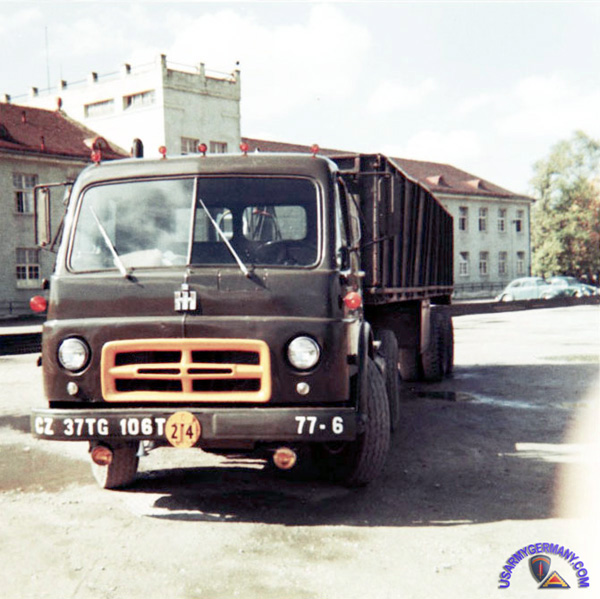 IHC 205 tractor driven by John D'Asto; 77th Trans Co barracks in background |
||||||||||||||||||||||||||||||||||||||||||
| 1968 | ||||||||||||||||||||||||||||||||||||||||||
| (Source: Email from John D'Asto, 77th Trans Co, 1968-69; HQ 106th Trans Bn, 1969-71) | ||||||||||||||||||||||||||||||||||||||||||
| I was stationed with the 77th Transportation Company, Eastman Barracks, Dachau, Germany, from 1968 to 1969 and the 106th Transportation Bn headquarters, Azbil Barracks, Russelsheim, Germany 1970 to 1971. I can contribute some history of these two units plus some photos. Also I'm sending 8 photos of artillery that occupied our motor pool with the 77th Trans Co. They are of the 3rd Bn, 37th FA, 8" Self propelled guns. Looking at your web site I found the correct name of the unit (after all these years and fading memory). Look under: 35th Field Artillery Group, VII Corp Artillery then scroll down to red box that says 35th FA group. It mentions Dachau and the 3/37 there. (Click here to see John's photos of 3rd Bn, 37th Arty SP howitzers at Dachau) I’ll add what I personally known about the history of these two units. The 77th Transportation Company, Eastman Barracks, Dachau. |
||||||||||||||||||||||||||||||||||||||||||
|
||||||||||||||||||||||||||||||||||||||||||
Eastman Barracks had most things anyone needed: a clinic, dentists, PX, NCO and Officers clubs and a movie theatre. All this was situated on one side of the kaserne close to the artillery battalion. Most of the other buildings between us were shuttered. It gave the place abandoned feel. I say it was haunted. We loved our side of the kaserne because of the golf course that was situated along that edge of the kaserne. We got to use the pro shop’s bar and restaurant and since it was 50 some yards from our barracks it felt like it was our private club. Of course the kaserne originally was there to house the SS troops that ran Hitler’s first concentration camp. I got to visit that once by sneaking trough the old barbed wire fence. Most of the SS troop’s barracks were razed by the time I got there though. The artillery battalion was housed in an SS barracks that still had the original German eagle that was painted red, white and blue by the army with the Swastika chipped out. The 77th Transportation barracks formerly housed an SS school. The 77th had been stationed in France for many years but had been relocated to Germany following France’s withdrawal from NATO. Before I arrived it had recently been located in the Kassel area. But after realigning the battalion LOC, Dachau became the new home around 1967. Some of the older guys who had been part of move out of France kept a sign in the barracks that had been on the last truck of their group leaving France. What was written on it was indicative of the sour feeling they had about being kicked out. It was a large white sign with large type on top that read “Lafayette Old Boy…”, then a large green frog in the center of the sign, followed by the last line on the bottom, “… We Tried!” |
||||||||||||||||||||||||||||||||||||||||||
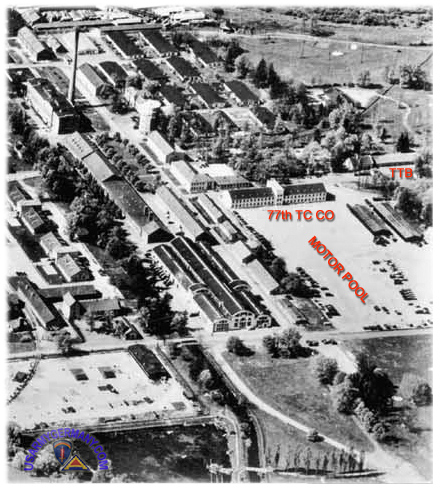 77th Trans Co area, Eastman Barracks, Dachau |
||||||||||||||||||||||||||||||||||||||||||
The company barracks, motor pool and TTB (Trailer Transfer Point B) was located in the northwest corner of Eastman Barracks. Det B ran an emergency help truck (civilian style) along the autobahns in our area for breakdowns. We shared the motor pool and maintenance bays with an artillery battalion, the 3rd Bn, 37th FA, 8” self propelled guns. The guys who served in France and drove the old M52s said they had mechanical turn signals that stuck out small lengths of wood when signaling turns. They said they tried to hit bicyclers with them. By the time we arrived we the battalion was driving the IHC 205. |
||||||||||||||||||||||||||||||||||||||||||
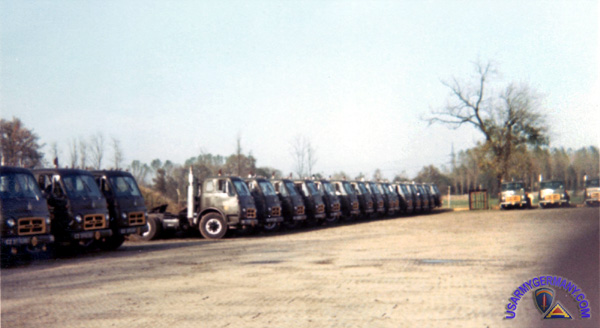 IHC 205 tractors in the 77th Trans motor pool |
||||||||||||||||||||||||||||||||||||||||||
The 77th was a diverse group of guys, many drafted. Oregon, Mn, Ohio, Cal, NY. Older and real young. White, Black, Latino, American Indian. It was the late 1960's so we had a lot of peace signs going on (note the photos). The company consisted of three (3) truck platoons, a maintenance platoon, and a headquarters platoon. Pretty basic. |
||||||||||||||||||||||||||||||||||||||||||
|
||||||||||||||||||||||||||||||||||||||||||
| Looking at satellite photos of the kaserne today shows that all the buildings that the 77th used have been razed except for the building we used as our barracks. I read that the Bavarian State Police use the kaserne now. | ||||||||||||||||||||||||||||||||||||||||||
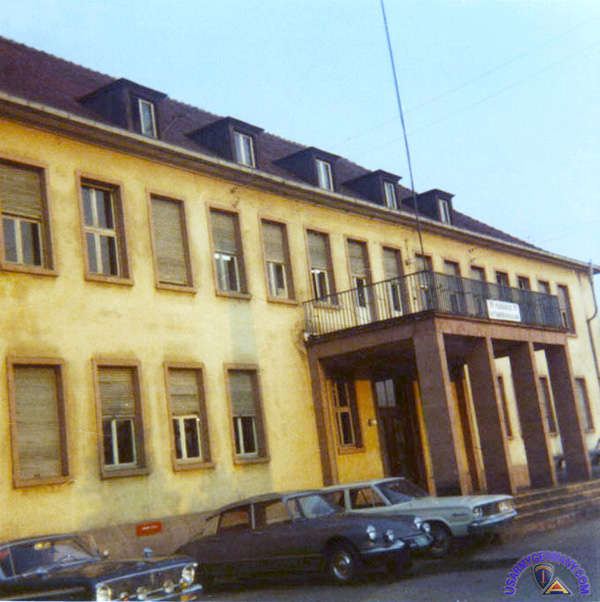 HQ building, 106th Trans Bn, Azbill Barracks, Rüsselsheim |
||||||||||||||||||||||||||||||||||||||||||
The 106th Transportation Battalion Azbill Barracks, Ruesselsheim. Azbill Barracks was basically two large buildings; headquarters’ offices and their barracks in one and the 78th Trans Company and mess hall in the other. There was a large field in front (see change of command photos) and the motor pool and TTA (Trailer Transfer Point A) behind. There was a VERY small PX outlet run by one the guy’s wife but it really was more for cigarettes and sodas than anything. We had no other support there so we were forced to go to Wiesbaden AB for medical and PX services. They ran a small club in the Headquarters building but that pretty much died. When I arrived from the 77th I was assigned to the battalion to help coordinate trailer deliveries through our LOC. I worked with 5 other NCOs and specialists. We would coordinate the trailer deliveries on a big board at night and then call up the trailer transfer points to get ready for the next day. I never got to see the new IHC 4070 tractor before I rotated back in March of 1971. The battalion was still using the IHC 205. I wish I knew the history of the 77th or the 106th at that time just to have a clearer feeling about the units you’re serving in. It would be hard for anyone now to go back to visit like I’ve seen on some web sites. As you see from Google maps the base has been wiped away by the Germans accept for the building we used for the headquarters. Time marches on. It’s never the buildings though, it’s the men who live in them. You know, when you’re in it can be awful sometimes and great other times. I got to travel to Amsterdam, Spain, and Garmisch in the German Alps. I met a lot of people, good and bad and years later, I wouldn’t change it for anything. |
||||||||||||||||||||||||||||||||||||||||||
| 78th Transportation Company | ||||||||||||||||||||||||||||||||||||||||||
| 1970 | ||||||||||||||||||||||||||||||||||||||||||
| (Source: Email from Don Davis, 78th Trans Co, 1970-71) | ||||||||||||||||||||||||||||||||||||||||||
| I was with the 78th Trans Co of the 106th Trans Bn from February of 1970 to February of 1971 at Rüsselsheim. Being with the 106 was sort of a status position as I felt it. We were over the road drivers. When I got in country they sent me to Worms for assignment to a company. I was a 64A20, light truck driver. They called me and one other fella in to see a staff sgt who asked us to volunteer to drive semi, 64B20. He told us there was a shortage of drivers in the 37th (Trans Gp). I remember my dad saying never volunteer but I figured I'd take a chance. I guess a lot of the GIs there saw us as "special or lucky." I actually had a guy wave me down when I was driving through one of the towns wanting to know how he could get a job like we had. They assigned us to the 106 which had just moved to Russelsheim shortly before we had gotten there. I stayed there, in Russelshiem with the 78th as did the guy who volunteered with me. There were about 4 or 5 other companies driving the same trucks, doing the same mission.
As the guy said, they were short on drivers in the 37th. Anyone coming into the company at the rank of E-4 or higher wasn't sent to the driving school in Dachau. They were teamed up with one of the experienced drivers to learn the ropes. I was an E-4. After the required 3,000 shotgun miles they gave me a tractor and sent me to Giessen to pick up a load. Our main mission was delivering commissary goods and, if the truck was running, so were we. There were some real benefits to that! You were never around for an inspection and being on the road was like having your own truck and the Army paying the bills. There was a standing order in Germany that required any US military company to provide us with fuel upon our request or anything else within their ability to provide in order to keep us moving.
The Company was just a starting point. Oh, you could come in whenever you felt the need but all you had to do was call the dispatcher and let him know where you were from time to time. Giessen was the main "terminal". You would go there to pick up a load and bring in empties. There were so many loads going everywhere they would actually ask you if you had a preference as to load destination. They would get you one there or near there every time.
I had been in the company for more than a month and was running with another guy from the 2nd platoon, I was assigned to the 1st platoon. We had loads to Nuremberg. It was late when we got there so we fueled up our trucks and headed for the transportation down town to the transit hotel. Yea, that's right! They put us up in a hotel not far from "the wall"...it was within walking distance. The accommodations weren't real good. There was a room at the very top of the hotel about 12 x 8 and in it was about 12 or 14 bunks with just enough room to make your way. I can't remember the latrine facilities but I guess they had them. Anyway, the guy I was running with stopped to talk to two other guys as we walked across the motor pool. I kinda figured if you are on the road a lot you meet fellas from other companies. After they walked off he asked me if I knew who they were. I said, "No". He said they were out of our company and hadn't spent a night there in over 3 months. They came in to get their checks and went right back out again. I never did get to know those guys. We had two guys that ran the mail. They drove everyday except Sunday and were on the road from sun up to sun down and then some. The guys on the mail run had a great chance of reaching over 100,000 miles in the year and half they were there but they only counted if you didn't have an accident that was your fault. The good thing about the mail run was that you didn't have KP or down time because of your truck. When your truck was down they gave you a different one. A draw back was getting a day off!
From November first till after Christmas we made a lot of "turkey" runs. We would haul 40 foot reefers filled with turkeys. You would think that with all those turkeys running up and down the road there would have been turkey on every table in the mess hall. NOT SO! We had 2 turkeys at Christmas. One was put on the officers table to be eaten and one was put on the NCO table...for looks! We got canned turkey! While we were there we had some political situations connected with Lebanon. Around 3 a.m. we would be routed out of bed and sent to Mainz. They had trailers spotted on a parking lot loaded with combat gear. Our orders were to back up to but not under the trailer and await further orders to take the loads to Rhine Main, back the trailers on to aircraft and go with the load to destination and await further orders. The first "Mainz Alert" lasted about 10 days. We couldn't leave the truck except to go to the "Johnny on the spot". I lost a lot of drive time during that time! Sitting there in a hot truck (it was June or there abouts as I recall) with nothing to do for 10 days will drive you crazy! Of course, "further orders" never came.
About 3 weeks later we got another call for another Mainz alert. Same deal. This time we were aloud to go to the recreation hall at the PX. It was just up from the parking lot about 50 yards, same parking lot. That's the Army for you! I was involved in 3 of those alerts. I think that was all they had...THANK GOD! The best job we ever had was driving to Holland to pick up containers at the harbor. We would go to one of two ports, Amsterdam or Rotterdam. We had to stop at the border to change cloths and process paper work. Since Holland was neutral we had to drive in civilian cloths while there and change back into uniform when we crossed the border. I've no idea what was in the containers. I remember one of the sergeants who had been assigned as mess hall sergeant wanted to switch to platoon sergeant for drivers. It was about Christmas time. In fact only 2 days before Christmas. He got assigned to NCO a run to Amsterdam to pick up containers. As I recall there were about 6 or 7 of us making the run. I pulled an empty and so did a couple of other guys. Three bobtailed there. The sergeant was determined to be back in company for Christmas. Since you couldn't drive up there and back without getting fuel we had to stop at a civilian designated fuel station. I don't know what the arrangements were with the owner but he closed at 10 at night maybe even earlier. Anyway I was down to a 1/4 tank of fuel. It was already getting dark before we left the port and the sergeant wanted to drive all the way through. I told him I didn't have a prayer of making it. He gave me an order and I said OK! The 3 guys that had bobtailed just made it back to company. They were now pulling loads. One of the guys that pulled and empty bought fuel out of his own pocket and one was lucky enough to have some un-used Esso stamps. I wasn't so lucky. I ran out of fuel half way up that hill, over by Cologne, with the skull and cross bones and warning lights at the top! I was not a happy camper! We also got assigned to haul radio towers. That was great duty. They were light weight and you usually ran in groups of about 3. They were never put up near military bases which meant you stayed in the truck and ate a Guest House. I was there for part of 2 winters and in that time I never seen one snow plow. They had little dog houses every so often as you were going up the hills that had sand in them just incase someone couldn't get up the hill. Traffic packed the snow down. I remember coming down a mountain one day on a snow packed road and checking my mirrors. All I could see was the side of my trailer. It's a funny feeling when your trailer is challenging you to a down hill skiing race. I grabbed another gear and accelerated to avoid a jackknife.
We even got stuck hauling wrecked duce'n'halfs. They were priority #1 loads. They never bothered to tell us why. We would pick them up at Karlsruhe and take them to Bremerhaven. I have no idea how they could wreck so many trucks! On one of the trips three of us picked up loads at 7 pm. We stopped at Giessen to refuel to make the trip. It was already past 10 so we called battalion and told them we were going to get some sleep and leave early in the morning. They said OK. We were on the road by 5 or earlier and met a bunch of guys coming back. Sgt Page was in charge. He flagged us down and chewed us out because we weren't there on time. When we got back they wanted to give us each an Article 15 until we told them what Battalion said. They asked us to prove it so as luck would have it the dispatcher at Giessen over heard the conversation. As luck would have it he ETS back to the states two days later. They made a special call to him at his parent home to verify our story. The reason the wrecked trucks were priority #1 is that they were holding a freighter (The Callahan) to haul back to the states. What we found out was that the guy that told us to get some shut-eye was a Spc. 4. The next time I seen him though he was a PFC.
I guess the company wanted to get their evens with me because not long after that my fuel pump went out as I was leaving the holding area at Karlsrue. With at least five of our trucks coming past me every day and talking to at least one of them each time and having called in three times a day to tell them where I was at it still took them five days to get me a fuel pump and then only because I told them it was my last call to the company. The next was going to the IG. Their excuse was that they couldn't find me. We had a young mechanic who wanted to drive so bad that he reenlisted for that end. They sent him to Vietnam where after only a short time in country his truck, which was loaded with JP-4, hit a land mine. Enough said.
Rüsselsheim post was a half city block consisting of our barracks, battalion building, maintenance garage and a small PX...very small, about 12x12. I understand that after we left the military there built up considerably. I also hear that there now is little or nothing left. I have a lot of other memories but I'm sure you want to keep this to the things others who were there then can relate to so I'll let it go at this, except for this parting comment. The 78th at that time was a family and some of us still are. I brought home five friendships from that year in my life that are with me today. One was the best man at my wedding and even though the marriage didn't last our friendship has. I was also best man at his wedding...his didn't last either. At least every other year he and I visit even tough it's 450 miles away.
One of my friends lives in Connecticut so I haven't seen him since Germany but the others have had several reunions in the past several years. One became a farmer, one a railroad engineer, I became a civil servant and the others remained truck drivers. I still feel something special every time I see a semi and I see a lot of them. My year in Germany remains one of the happiest I've ever had. |
||||||||||||||||||||||||||||||||||||||||||
| Related Links: |
||||||||||||||||||||||||||||||||||||||||||
